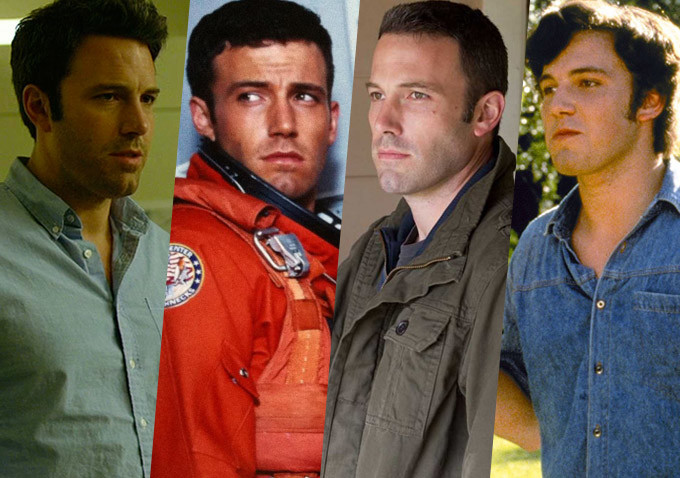
10. “To the Wonder” (2012)
As divisive a film as Terrence Malick had made up until last week when“Knight of Cups” was released, there’s still enough exceptional filmmaking on display in “To the Wonder” to merit its inclusion in the top 10 Affleck-starring films. Of course, as often with Malick, it’s hard to really credit Affleck’s input too much — like Sean Penn before him, in “Tree of Life” andChristian Bale after him in ‘Cups’ Malick’s leading man here is less a fully-realised character that an actor can embody, than a proxy for Malick himself, essentially the receptacle for all the thoughts, questions and yes, wonderment that the director is trying to convey. Here, Affleck’s Neil is very much in that mold, ostensibly at the center of a love triangle between Olga Kurylenkoand Rachel McAdams, but the film is far less interested in him than it is in its women, particularly Kurylenko, as these fascinating and yet also ultimately unknowable objects of desire.
9. “Hollywoodland” (2006)
We’re hardly the first to point it out, but yes, Ben Affleck, who plays Batman in the upcoming ‘Batman v Superman’ has also played Superman. Or, at least, he’s played the man who played Superman on TV in the 1950s — actor George Reeves whose gunshot death (an apparent suicide) has long been one of classic Hollywood’s most intractable mysteries. The plot thickens because of Reeves’ proximity to great studio “fixer” Eddie Mannix (whom the Coen brothers recently made the central character in “Hail Caesar!“) — Reeves was having an affair with Mannix’s wife Toni (played here by Diane Lane) and rumors have persisted that Mannix (Bob Hoskins) was responsible for Reeves’ death and/or responsible for covering it up as a suicide. If this were a list of Affleck’s best performances, it’s very possible that Allen Coulter‘s “Hollywoodland” would top it, he is really that good as the tragic Reeves, a victim of both stereotyping and the snobbery that existed between the TV and the film industries at the time. The film overall is let down by some of tis other elements, not least the introduction of Adrien Brody‘s unconvincing gumshoe character, but Affleck’s portrayal of a man seduced and then trapped by the glamor factory of classic Hollywood is worth it all by itself.
8. “Changing Lanes” (2002)
Roger Michell‘s unjustly neglected story of a fender bender that escalates into a corrosive game of brinkmanship is one of those films whose unappealing premise conceals a surprisingly convincing, crackling little thriller. Boldly confronting both class-based and racial issues, it follows Affleck’s Banek, a smarmy high-powered lawyer who has an accident on his way to file some crucial papers, which he then loses at the scene. The man he collides with, Gipson (Samuel L Jackson) is himself on his way to a vital court date, but the delay causes the judgement to go against him, and he loses custody of his children — he however has picked up Banek’s important documents after the lawyer left the scene of the accident without. And so the scene is set for a kind of cat-and-mouse drama with the roles of cat and mouse switching frequently, and where both are motivated by revenge and spite. To the credit of both actors it somehow remains believably tense even when circumstances progress to their most extreme, and it’s perhaps only the anticlimax of the ending that lets the film down at all.

7. “Chasing Amy” (1997)
Speaking of polarizing figures whose extra-curricular persona interferes with the appreciation of their work (where the work deserves it), Kevin Smith. Affleck, of course, was a card-carrying member, early on of the View Askewniverse, and turned up in a string of the director’s films, starting with his sophomore feature “Mallrats.” But the best of Affleck’s movies for Smith, and arguably the best of Smith’s movies aside from breakout “Clerks,” is “Chasing Amy,” in which Smith’s penchant for arch, smutty, pop-culture inflected dialogue is balanced by actual depth and characterization in a way he seldom managed elsewhere. Joey Lauren Adams has a small breakthrough as Alyssa, the not-heterosexual object of Holden’s (Affleck) affections, while Jason Lee plays Holden’s best friend, who is in love with him. Its portrayal of homosexuality may feel a little unenlightened to the more modern eye (lesbians in particular, outside of Alyssa, are mostly stereotypes) but as an unusually sincere attempt to deal with the complications of falling in love with the wrong person, “Chasing Amy” still works, and is still a career high point for all involved.





